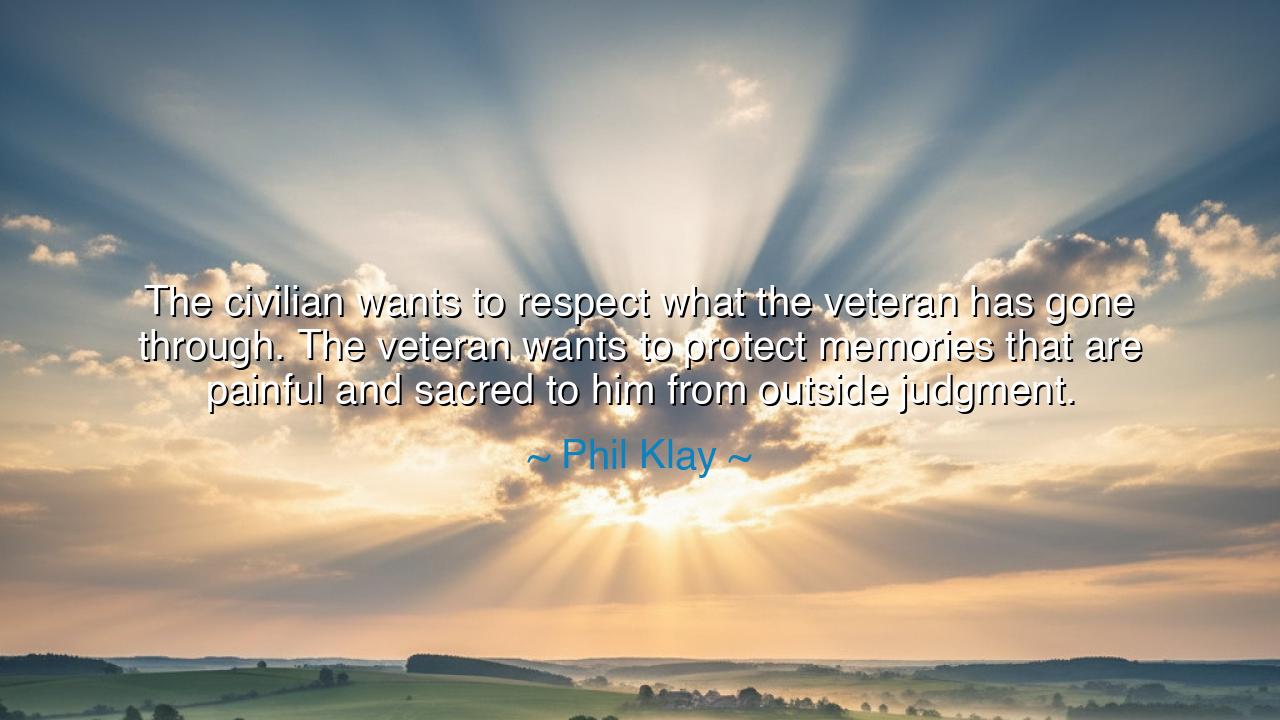
The civilian wants to respect what the veteran has gone through.
The civilian wants to respect what the veteran has gone through. The veteran wants to protect memories that are painful and sacred to him from outside judgment.






Hear, O children of remembrance, the words of Phil Klay, warrior turned storyteller, who declared: “The civilian wants to respect what the veteran has gone through. The veteran wants to protect memories that are painful and sacred to him from outside judgment.” In this saying is revealed the tension between two worlds: the world of peace, which longs to honor, and the world of war, which bears scars too deep for easy speech. The civilian seeks to understand, yet the veteran guards his memories as one would guard holy relics—too sacred to expose, too painful to share.
The origin of this wisdom lies in the eternal distance between those who fight and those who are fought for. Since the dawn of armies, the soldier has carried experiences that the rest of the people cannot truly fathom. The clash of steel, the cries of the wounded, the silence of the dead—these live in the veteran’s heart like unhealed wounds. To the civilian, these are stories to be told, honored, and remembered. But to the veteran, they are not merely stories; they are living shadows, heavy with grief, honor, and unspeakable cost.
Consider the tale of Odysseus, returning from Troy. His people greeted him as a hero, yet the trials of war and sea weighed upon his soul. How could he tell them of the cries of the slain, the wrath of Achilles, or the grief of Hector’s widow? He concealed much, for what he had endured was beyond the realm of their understanding. So too do countless veterans in every age protect their memories—not out of shame, but out of reverence for the fallen and fear of trivialization.
Klay’s words also reveal the paradox of respect. The civilian, with pure intent, may ask questions or seek stories to bridge the gap between war and peace. Yet these very questions may feel like intrusions, pulling at wounds not ready to be uncovered. The veteran, in his silence, may seem distant, but his silence is itself an act of protection—for his comrades, for his memories, and for the sanctity of experiences too sacred for casual discussion.
Let us also recall the warriors of World War I, who returned from the trenches broken in body and in spirit. Many spoke little of what they had endured, for no words could capture the filth of the mud, the thunder of shells, the endless waiting for death. Yet civilians longed to know, to honor their sacrifice. Here lay the gulf: one side yearning to respect, the other struggling to protect. This gulf is what Klay, in his wisdom, urges us to recognize and honor.
The lesson, O children of tomorrow, is this: respect the veteran’s silence as much as his words. Do not demand stories as though they were owed to you. Know that sometimes the deepest respect is to listen without pressing, to honor without prying. Let your gratitude be steady, your patience unshaken, for memory is a heavy burden, and it is the veteran’s right to share—or to keep—what he carries.
Practically, this means cultivating humility. When you meet a veteran, do not assume you can fully understand. Offer respect without expectation, gratitude without intrusion. If stories are given, receive them with reverence. If silence is given, receive that too with equal honor. In this way, you acknowledge that the civilian and the veteran walk different paths, yet both contribute to the fabric of a nation’s life—the one by sacrifice, the other by remembrance.
Thus, Phil Klay’s words shine as an enduring reminder: the civilian longs to respect, the veteran longs to protect. Between these two longings lies a sacred space, one that must be approached with patience, humility, and reverence. Let us walk wisely in that space, so that we honor the warrior without burdening his soul, and keep alive the memory of sacrifice without trespassing upon the wounds of the heart.






AAdministratorAdministrator
Welcome, honored guests. Please leave a comment, we will respond soon